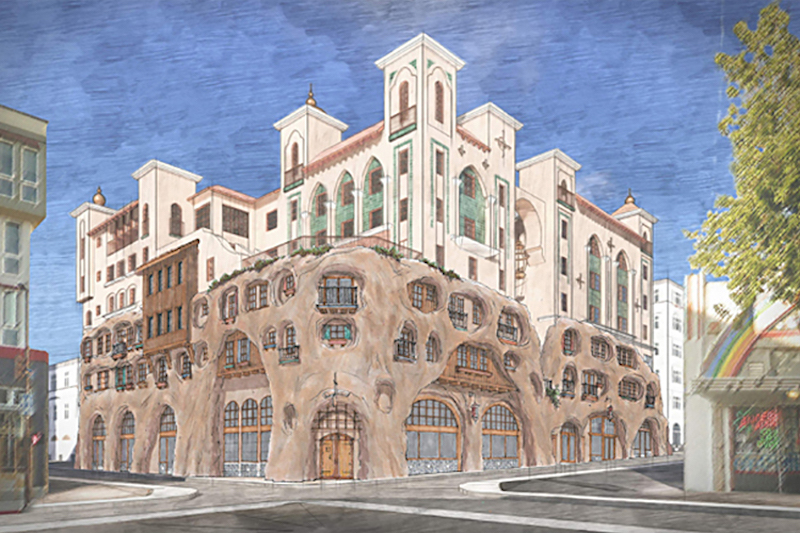Located at the corner of Telegraph and Haste Avenues, just three blocks from campus, UC Berkeley’s new Enclave Apartments is nearing completion.
The building, which will feature 55 dorm rooms and have an overall capacity of 254 students, has what the university is calling a “Moorish Castle” design. The original project team was inspired by Italian hill towns, Tibetan forts, and the rock-cut architecture of Petra in Jordan, according to Berkeleyside.com. The top half of the seven-story building has a very Mediterranean-inspired design; it isn’t until you take a peak at the lower three levels where that Petra inspiration really begins to take shape.
The bottom three floors feature a rock facade that looks like it would be more at home in a Disney theme park than near a college campus. The building’s entrance will be made of concrete meant to look like rock with the Moorish castle sprouting from the top about three floors up.
See Also: Kenya’s Pinnacle Tower will be the tallest tower in Africa
The all-gender facility will feature single gender, single and double rooms in shared apartments with two bathrooms. Other features include a shared kitchen with a living/dining area, an outside courtyard, two elevators, WiFi, a trash chute on each floor, and on-site laundry. Additionally, businesses will be housed on the ground floor.
The building is expected to be completed in the fall of 2020.
Related Stories
| Aug 11, 2010
Living and Learning Center, Massachusetts College of Pharmacy & Health Sciences
From its humble beginnings as a tiny pharmaceutical college founded by 14 Boston pharmacists, the Massachusetts College of Pharmacy & Health Sciences has grown to become the largest school of its kind in the U.S. For more than 175 years, MCPHS operated solely in Boston, on a quaint, 2,500-student campus in the heart of the city's famed Longwood Medical and Academic Area.
| Aug 11, 2010
Giants 300 University Report
University construction spending is 13% higher than a year ago—mostly for residence halls and infrastructure on public campuses—and is expected to slip less than 5% over the next two years. However, the value of starts dropped about 10% in recent months and will not return to the 2007–08 peak for about two years.
| Aug 11, 2010
Team Tames Impossible Site
Rensselaer Polytechnic Institute, the nation's oldest technology university, has long prided itself on its state-of-the-art design and engineering curriculum. Several years ago, to call attention to its equally estimable media and performing arts programs, RPI commissioned British architect Sir Nicholas Grimshaw to design the Curtis R.
| Aug 11, 2010
Setting the Green Standard For Community Colleges
“Ohlone College Newark Campus Is the Greenest College in the World!” That bold statement was the official tagline of the festivities surrounding the August 2008 grand opening of Ohlone College's LEED Platinum Newark (Calif.) Center for Health Sciences and Technology. The 130,000-sf, $58 million community college facility stacks up against some of the greenest college buildings in th...
| Aug 11, 2010
University of Arizona College of Medicine
The hope was that a complete restoration and modernization would bring life back to three neoclassic beauties that formerly served as Phoenix Union High School—but time had not treated them kindly. Built in 1911, one year before Arizona became the country's 48th state, the historic high school buildings endured nearly a century of wear and tear and suffered major water damage and years of...
| Aug 11, 2010
Cronkite Communication School Speaks to Phoenix Redevelopment
The city of Phoenix has sprawling suburbs, but its outward expansion caused the downtown core to stagnate—a problem not uncommon to other major metropolitan areas. Reviving the city became a hotbed issue for Mayor Phil Gordon, who envisioned a vibrant downtown that offered opportunities for living, working, learning, and playing.







